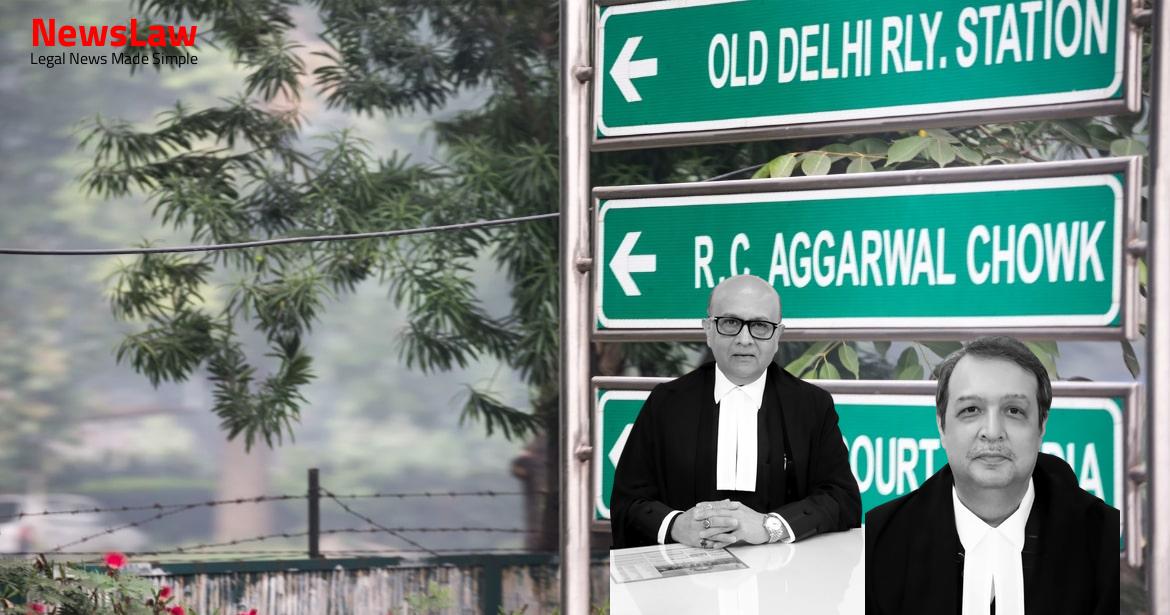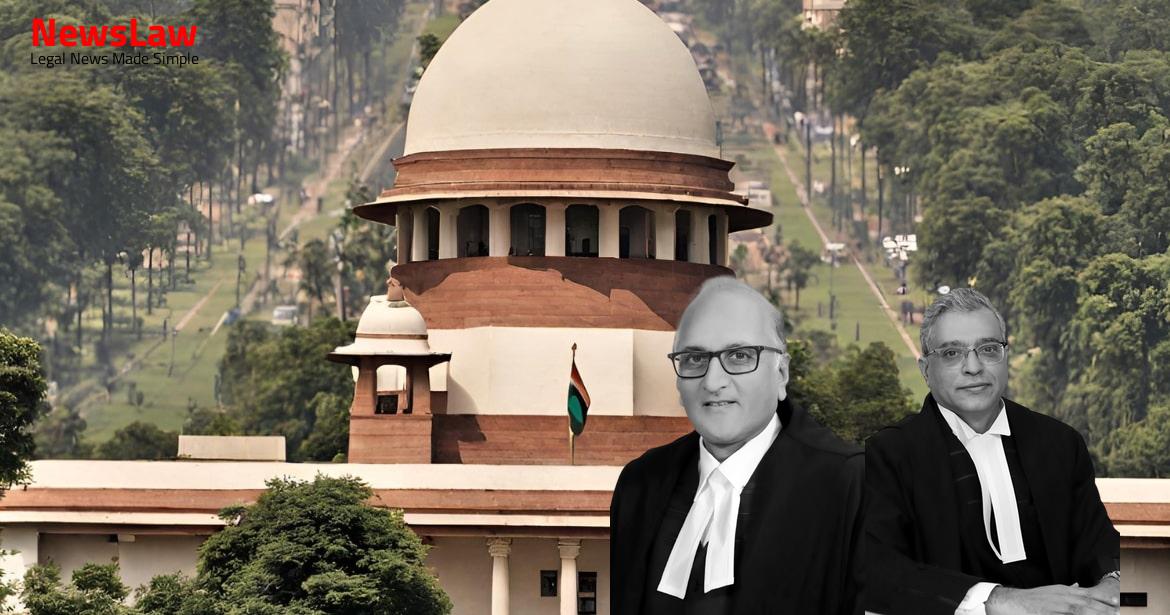The legal case delves into the analysis of the regularization of contract laborers in the Food Corporation of India, focusing on the court’s detailed examination and decision-making process regarding this important aspect of labor rights. The court’s thorough legal analysis sheds light on the complexities surrounding the regularization of workers in a government agency and provides valuable insights into the legal framework governing such matters.
Facts
- Contempt Petition (Civil) No 754/2019 arises from a separate judgment and order on the same subject matter and date as Civil Appeal No. 7961/2014.
- Direction for departmentisation of FCI workers in F.S. Depots was given, with workload to be divided by 240 days instead of 365.
- Labour Cooperative Societies proposal for departmentalization to be sent to the government by 31 July 1996, with Direct payment System to continue till decision is made.
- Assessment of labour strength in other FCI depots to be based on a formula evolved in consultation with FCI Workers Union, as the current workload division by 365 days was deemed unrealistic.
- Charter of demands from FCI Workers Union taken into discussion with decisions made on each demand, including departmentalisation of workers and payment of documental wages.
- The Tribunal directed the management to regularize and departmentalize 955 contract laborers engaged through a cooperative society with all attendant benefits.
- The Corporation’s appeals against the Tribunal’s decision were dismissed by the Court, confirming the award and the writ issued by the Kerala High Court.
- Despite the confirmation of the award, the Corporation did not take any initiative, leading to contempt proceedings.
- Management should resort to changes in consultation with the Union.
- DPS workers are assured of minimum guaranteed wages, paid weekly off, holidays, sick leave, and other benefits.
- The DPS workers’ productivity-linked incentive is declared by FCI HQ from time to time.
- Workers in South India food storage depots of FCI were entitled to regularization as per the notification under the Contract Labour Act.
- Various judicial orders and discussions led to decisions for the Direct Payment System and benefits for workers in FCI depots.
- The service benefits under DPS outline a regular engagement by the Corporation, not on a contractual or casual basis.
- Legal heirs of DPS workers are eligible for compassionate appointments.
- DPS workers receive monthly wages directly from the Corporation as per government policies.
- Judicial decisions upheld the awards passed by the Tribunal regarding DPS workers.
- Contempt petitions and court orders were issued for implementing awards and providing benefits to DPS workers.
Also Read: Analysis of Legal Issues in Property Dispute Case
Issue
- Whether the action of the management of FCI (respondent) in denying to regularize 955 contract laborers engaged by management of FCI godown at Avadi through Thiru VI is justified.
- If not justified, what relief are the laborers entitled to?
- Whether the services of workmen employed in different Food Storage depots in Food Corporation of India in the South, where notifications have been issued prohibiting engagement of contract laborers under Section 10(1) of CL (R and A) Act, are entitled to be regularized and if so, from which date.
Also Read: Legal Analysis on Levy of Customs Duty on Non-Excisable Goods Sold in Domestic Tariff Area by an EOU
Arguments
- The Food Corporation of India is an agency to implement food policy of the Government of India.
- The agency protects farmers by ensuring minimum support price for their produce and provides food grains to poor consumers at highly subsidized rates.
- The Corporation undertakes purchase, storage, movement, transport, distribution, and sale of food grains.
- There are material differences between the service conditions under the Departmental Labour System and the Direct Payment System (DPS).
- The Corporation has been advised to declare the Departmental Labour System as a dying cadre.
- The petitioners argue that the Corporation is obligated to regularize concerned workers in the Departmental Labour System.
- There is ongoing adjudication on the parity of wages between employees under DPS and those under Departmental Labour System.
- The Corporation states that out of 1800 depots, over 1500 operate under contract labour system employing a significant number of workers.
- If all regular workers are brought under the Departmental Labour System, it would incur a recurring financial burden on the public exchequer.
- The relief granted by the Tribunal in previous cases relates back to the initiation of Reference proceedings when regularisation was done under the Departmental Labour System.
Also Read: Land Acquisition Notification Process: Legal Analysis
Analysis
- Civil contempt action requires looking into the mind of the person/contemnor by gauging his actions.
- Deliberate conduct means the person knows what he is doing and intends to do so.
- The willingness and intent are indispensable requirements to prove contempt.
- Contempt proceedings should not be ordered unless there is a degree of default or misconduct.
- Respect and authority commanded by courts are crucial for protecting rights and maintaining the democratic fabric of society.
- Contempt jurisdiction is a powerful tool for maintaining respect for the judiciary.
- Standard of proof required in contempt proceedings is beyond all reasonable doubt.
- Wilful acts must be knowingly intentional, conscious, and deliberate with full knowledge of consequences.
- Civil contempt requires disobedience to be wilful, deliberate, and with full knowledge of consequences.
- Wilful acts are distinguished from careless, thoughtless, or inadvertent actions.
- Acts done negligently or involuntarily do not constitute wilful contempt.
- Disobedience of an order must be proven as ‘wilful’ to punish a contemnor.
- The issue of regularisation of workmen under a particular labor system was not specifically raised before the Tribunal or higher courts.
- The extant policy of the Corporation since 1991 was to regularize workmen only under the Direct Payment System (DPS) after abolition of the contract labor system.
- The judgment upheld by various courts did not mandate regularisation under the Departmental Labour System.
- Departmentalisation, as a concept, was not specifically addressed in the judgement, and it was not a requirement for the Corporation to regularise workmen under a specific labor system.
- The Corporation complied with the award by regularising workmen under the DPS as per the existing policy.
- The parallel cases in different states, as well as the dying cadre status of the Departmental Labour System, supported the Corporation’s decision to regularise under the DPS.
- No deliberate disobedience or contemptuous conduct was evident as the Corporation acted according to the applicable policy and existing directives.
- Judicial decisions and awards did not mandate departmentalisation and the Corporation’s actions were found to be in line with the applicable policy.
- The Courts did not issue specific directions for regularisation under a particular system, thus supporting the Corporation’s regularisation under the DPS.
- The overall analysis of the judgment reveals a focus on upholding the existing policy and ensuring compliance with the awards.
- The Corporation’s decisions and actions were deemed reasonable and in accordance with the provided relief.
- If there had been clear direction by the Tribunal, High Court, or Court, the situation could have been viewed differently as a contempt action.
- No attempt was made to misinterpret any direction in the case.
- No case for initiating contempt action against the respondent Corporation and its officers has been established.
- Other aspects of the matter do not need to be analyzed as they were not relevant to the contempt action.
Decision
- Petitions dismissed for failing
- Show cause notices discharged
- Contempt proceedings do not allow for certain behavior
- Interlocutory applications disposed of
Case Title: THE WORKMEN THROUGH THE CONVENER FCI LABOUR FEDERATION Vs. RAVUTHAR DAWOOD NASEEM (2020 INSC 401)
Case Number: CONMT.PET.(C) No.-000404 / 2019



